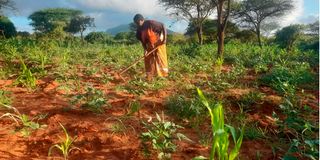Taita Taveta: From farming giant to relying on imports

Ms Jennifer Mwambogho at her farm in Ngolia, Taita Taveta County on January 2, 2023.
Once seen as the Coast region’s food basket, Taita Taveta County now faces an uncertain future due to shifts in agriculture practices and other challenges.
Despite boasting of fertile soils, favourable climatic conditions and abundant natural resources, the county now finds itself grappling with a significant decline in agricultural production.
It has been reduced to depending on food from neighbouring Tanzania, raising concerns about food security in the region.
For years, farmers in the region cultivated a wide variety of crops, including maize, vegetables and fruits. The produce not only sustained the local population but also contributed significantly to Kenya’s exports.
But now, climate change and limited access to inputs such as quality seeds and fertilisers, coupled with failure to adopt modern farming techniques, have hindered the farmers’ ability to maximise production.
Mr Mathenge Kamuzu, a farmer in Chala, said he used to supply assorted vegetables for export. However, over the past few years, production has declined. He added that over 700 farmers in the 1,800 acres of farmland in Chala are grappling with inadequate irrigation water.
“One of the key challenges has been the climate change that has led to unreliable rainfall and prolonged droughts,” Mr Kamuzu said. He also urged the government to provide extension services and agricultural training to ensure that farmers have the necessary resources and knowledge to overcome the challenges they face.
“We are now planting maize, sweet potatoes and tomatoes for local markets. We ceased relying on international markets because of poor prices,” he said.
Mr Chrispus Mathew, a farmer in Mwachungwani, said the cost of production has gone up, forcing farmers to abandon agriculture for other ventures. He said the costs of producing onions, tomatoes, peas, maize and other horticultural crops have significantly increased due to pests and diseases.
The shift away from agriculture has left many farmers grappling with a decrease in household incomes, thereby adding to the socio-economic challenges in the county.
A spot check at the Taveta cross-border market established that Kenyan traders now rely on produce from Tanzania to earn an income, further exacerbating the area’s food dependency.
Ms Selina Kidodore, the Taveta market chairperson, told the Nation that the market is currently experiencing an influx of produce from Tanzania. She said proximity to the border allows for relatively easy trade and transportation of agricultural produce.
She admitted that the increasing reliance on imported food products leaves the region vulnerable to supply chain disruptions and price fluctuations.
According to Ms Kidodore, Kenyan traders get their vegetables and fruits from Himo, Moshi and Mwika in Tanzania.
“The price there is lower than here in Taveta. However, the fluctuation of the exchange rate of our currency is the main challenge,” she said.
Governor Andrew Mwadime said efforts to reverse the decline in agricultural production are underway, as both his administration and partner organisations are working to empower farmers to produce more.
“We are revitalising the agricultural sector through various initiatives that have been launched to promote climate-smart agriculture, provide training programmes, introduce modern farming techniques and enhance access to credit and market opportunities for farmers,” he said.
The governor added that through concerted efforts and investment in the agricultural sector, the county can regain its agricultural prominence.
“By addressing climate change, improving infrastructure and empowering farmers with the necessary skills and resources, we will once again become a key agricultural hub and ensure food security for our residents,” he said.





